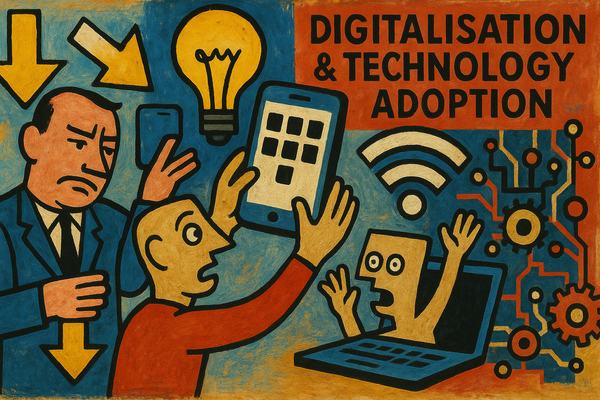1945 - the 80s. Memex, and the changing face of technology... #002

This is a history lesson.
There will be people reading, listening or watching parts of my blog that think that 10 years in the past is a considerable period of time. Most of my students are between 18 and 25 years old. If I ask them to remember what it was like when they were ten, they think “that's like so long ago”, but as a 50-year-old, being asked to remember what it was like when I was forty; it feels like yesterday. It was not so long ago.
Things have changed enormously in the last 30-40 years. We need to acknowledge that change to appreciate what might happen in the future.
'Little boy' and 'fat man'
Little boy fat man were the atomic bombs dropped during the Second World War.
Dr Vannevar Bush
I don't expect people to have heard of Dr Bush. He was one of five or six thousand people involved in research during the war, he worked on the Manhattan Project which led to the creation of the atomic bomb. I am mentioning Vannevar Bush because of ‘Memex’. Writing in The Atlantic Monthly in 1945 he says,
“Consider a future device for individual use, which is a sort of mechanised private file and library. It needs a name, and to coin one at random, ‘memex’ will do. A memex is a device in which an individual stores all his books, records, and communications, and which is mechanised so that it may be consulted with exceeding speed and flexibility. It is an enlarged, intimate supplement to his memory ”
Does this mind you of anything?
An iPhone, an iPad or similar device. For me, it's almost describing ‘now’. I like it because it was written in 1945. This wouldn't have had the same impact If it had been written in 2008.

Very occasionally it's nice to go back in time. When you do so, it sometimes helps you to appreciate that innovation takes time. Similarly, when you read academic articles that are older, especially when they're older than you, then you have to understand the social context in which they are written.
The Cassette Tape
In 1964, we saw the introduction of the cassette tape. The Police Service in the UK still make use of them to record interviews in some police stations. They now arrest people who have never seen a cassette tape before. They use two tapes,
one copy for you and one copy for me
The cassette tape has been around for so long, and even now, it appears to have undergone an increase in popularity. I wonder if this is due to films such as Guardians of the Galaxy.
APRANET
In 1968 (every marketing student should know this one). We saw the ARPANET.
It's rather like Formula One. Developments in Formula 1 end up in your car twenty years later. I bought my first BMW, a 1997 323i Coupe, I had the choice of air conditioning or a sunroof. It didn't come with air conditioning as standard, whereas pretty much all cars do today. Things move forward.
The ARPANET was about military, it was about the use of technology because of the Cold War, because of the threat of nuclear (think Franky Goes to Hollywood).
They wanted to come up with a way of connecting computers so that we didn't store everything on one computer because if that was blown up, then we would lose everything. So now can we store across multiple computers, we have networking, we have TCPIP.I think they wanted to call it the fishnet, this was the start of the Internet.
It is not until later that we associate the World Wide Web with Tim Berners-Lee in the 1990s. (see Berners-Lee, T., Cailliau, R., Luotonen, A., Nielsen, H. F., & Secret, A. (1994). The World-Wide Web. Commun. ACM, 37(8), 76-82.)
Pick up your pen, mouse, or favourite pointing device and press it on a reference in this document – perhaps to the author’s name, or organisation, or some related work. Suppose you are then directly presented with the background material – other papers, the author’s coordinates, the organization’s address, and its entire telephone directory. Suppose each of these documents has the same property of being linked to other original documents all over the world. You would have at your fingertips all you need to know about electronic publishing, high-energy physics, or for that matter, Asian culture. If you are reading this article on paper, you can only dream, but read on. Berners-Lee et al., 1992, page 461
Berners-Lee, T., Cailliau, R., Groff, J. F., & Pollermann, B. (1992). World-wide web: The information universe. Internet Research, 2(1), 52-58. Retrieved from http://links.emeraldinsight.com/doi/10.1108/eb047254
So, it goes from security, it goes from armed forces, into education and from education, it then goes into the public domain and becomes the Internet and then the Web as we know it.
Now we have Starlink. But that’s another posting altogether. See https://www.cnet.com/home/internet/starlink-satellite-internet-explained/ for some further details.
Decimalisation in the UK

On the 14th February 1971, the UK underwent decimalisation; no more pounds, shillings, and pence. We still deal with lbs and stone, we still deal with pints. How many people reading this would want to go to a British ‘Pub’ and order a 500ml glass of beer. It just doesn’t sound right. We want a pint.
This as a journey of an individual; this timeframe covers one lifespan.
Bar Codes
Consider your life and imagine not having a bar code. Not having a bar code, not being able to scan anything. Having to manually price items using a labelling gun. There were no barcodes at this point. There were no ‘sell by’ or ‘used by’ dates either. What would you do? How would you know if the product is edible? Consider the amount of stuff we throw away because it says so on the packet.

My parents' generation would give it a good sniff.
We throw away so much because somebody has said,
don't eat it because it's out of code
We grew up with a status-quo and accept it as the norm.
Apply ‘just the norm’ to the next generation. In twenty years time you might be married you might not, you might have kids you might not, you might be the next chief executive of an FT100 listed company.
EPOS, Electronic Point of Sale, Scanning.
We take it for granted, but scanning didn't come in until the mid/late 1990s.
Various things were happening in the 1970s, we had this thing called Channel 4. You have to remember with my generation until Channel 4, we only had tv channel one, two, and three; that was it. There was no YouTube, no Internet, no Sky, no Virgin Media, nothing. We had BBC1, BBC2 and ITV and that was it (and they shut off at midnight). Channel 4 came about and suddenly, there's this revolution in media.
We had the equivalent of the iPod. We had the Sony Walkman which everybody dreamed about when I was at school. Everyone wanted a Sony Walkman.
These technologies have had an evolutionary effect on our behaviour.
In the late 1980s, early 1990s, the ‘next directory’ was born. Their performance is a great example of how to get it right. They've been able to transfer the skill set of catalog delivery and logistics, (because behind all these websites there has to be supply chain and logistics) to the internet. They've managed to do it online, and they've done it brilliantly.
The World Wide Web came about in 1991 with the article by Tim Berners-Lee,
Computers provide us two practical techniques for human-knowledge interface. One is hypertext, in which links between pieces of text (or other media) mimic human association of ideas. The other is text retrieval, which allows associations to be deduced from the content of text.
How would we work without the likes of Google, without search engines. IT'S ALL ABOUT text at this point.
Now it isn't about text it's about media, it's about YouTube, it's about watching not reading.
You are consumers of media.
As online information proliferates, an important function is that of “third party” reviewers, indexers, and overview writers who refer to data they do not actually hold. It is expected that these services will be a key to the control of the information explosion and a valuable asset to the community.
Even back then, without the likes of a 'Google', without some way of curating information we will not be able to make a value from it.
Now consider your position and what you've given up for Facebook. The information you give up, the history that is held ‘in your faces’. Our digital footprint will is no longer own ours. I don’t believe it ever was.
EFTPOS (electronic funds transfer at the point of sale) and now contentless payment.
You are now used to waving your card near a terminal, and it takes your money. A bit of a swipe and off it goes. Credit cards used to be put in a mechanical machine that gave you a carbon copy receipt.
Give me the carbons, I don’t want you making another one
Technology has moved on significantly from handwriting to computerising it. Electronic funds transfer, out of town shopping, out of town retail and ‘big sheds’.
Dixons, Carphone and Currys. Dixons was the original store selling brown goods. It started out as a photography business, then, tv’s, portable audio etc. Brown goods were relatively small, so it was a high street operation. White goods, Currys, big boxes, took it out of town because warehousing is expensive. PC World is a weird one because nobody talks about a PC world any more (not in this context at least), hence bringing it together under one roof with Currys.
Out of town shopping and the decline of the high street
We have lost thousands of retail shops from our High Streets or central business districts. Banks have disappeared.
Now we are all consuming coffee socialites.
Coffee shops such as Costa, Nero. Starbucks and other smaller independents have taken over as we have changed.





